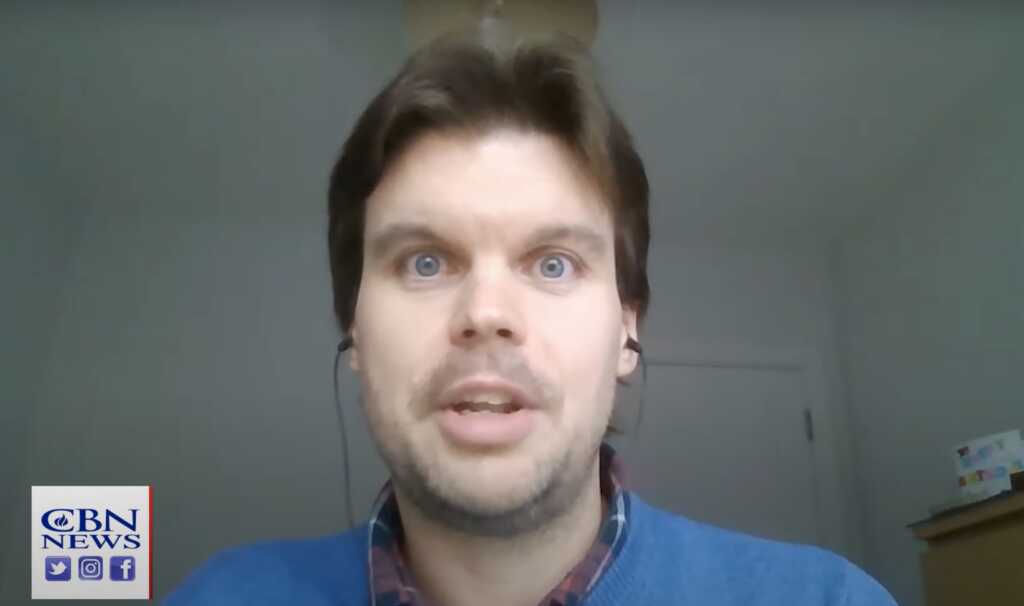In Peter Byrom’s story, famed atheist Richard Dawkins was the evangelist.
Byrom was born and raised in East Sussex, England, to a Christian family. He grew up nominally religious, but abandoned the vestiges of his faith when he left home for college.
Duped by the lie that Christianity is incompatible with intellectualism, Byrom dissolved whatever lingering interest he may have had in God and quickly turned to atheism — a transition fast-tracked by a roommate who, like him, was raised to believe in God but had since turned away from his upbringing.
Listen to the latest episode of the Faithwire podcast 👇
The roommate, Byrom recalled during a recent conversation with CBN’s Faithwire, was a fan of Dawkins and urged the new atheist convert to read the evolutionary biologist’s book, “The God Delusion.”
Byrom quickly read the book and was intrigued by the aggressive approach espoused by Dawkins and others like him.
“I was very taken by what Dawkins’ definition of faith is,” he said. “He said faith is believing something without any evidence. Now I know that’s a false definition of faith — that’s not what faith means. But at the time, I bought that.”
It didn’t take long, in fact, for Byrom to buy into the Dawkins dogma — hook, line, and sinker.
After reading “The God Delusion,” Byrom dove headfirst down a rabbit hole of content from Dawkins, Sam Harris, Christopher Hitchens, and Daniel Dennett, known as the “Four Horsemen of the New Atheism,” a term coined in 2006 by journalist Gary Wolf to describe 21st-century atheists who believe religion should not be tolerated as an acceptable alternative to atheism.
There’s no doubt, though, Byrom’s deep dive into atheist content didn’t bring about the result Dawkins may have hoped for. Instead of serving as the sage atheist leading Byrom further and further from faith, the famed author served as something of an evangelist to the then-college student.
Asked how he came to believe in Jesus, Byrom quipped, “There’s an extent to which you might have to blame YouTube.”
Like any college student eager to put off homework, he recalled watching a near endless stream of YouTube videos of Dawkins facing off with unprepared Christians who did not represent the faith well. For a while, that satisfied Byrom, but it didn’t last.
Soon enough, Byrom stumbled upon videos of Christian apologists debating atheists. He was particularly impressed with William Lane Craig, a Christian philosopher who runs the ministry Reasonable Faith.
He quickly realized that many of the arguments employed by Dawkins and others to advocate atheism weren’t really all that strong. What took Byrom by surprise, though, was that he began to open up to the possibility Christianity is true.
“It was surprising,” he said of his shift toward belief in God. “And, at first, it was actually quite unwelcome because I kind of entered into this almost as an interest, really, and I was rooting for people like Dawkins and so forth. Because I actually didn’t find the idea of there being a God, an authority like that very attractive and I would’ve preferred that it wasn’t true, but I just kind of got hooked.”
Byrom found himself so entangled in the issue that, at one point, he even went to an event hosted by Dawkins and, during a question-and-answer portion, asked the atheist why he had refused to debate Craig.
Dawkins, for his part, claimed Craig is a “professional debater” rather than a bonafide scholar and asserted his schedule is just too full to debate the Christian apologist.
As for Byrom, he said the “tipping point” in his shift from atheism to Christianity “was that I did come to realize that the objections that I had to Christianity — including the arguments of the new atheists — they really weren’t strong enough. I didn’t have any intellectual objections, any strong enough ones left. So all that I had remaining were actually just my very personal, emotional reasons for not wanting to come to faith.”
He has since had the opportunity to meet with Craig and his wife, Jan, who impressed upon Byrom the importance of taking his newfound faith seriously.
“She just said very clearly to me, Look, Pete, it’s great that you have come to this point of you say[ing] that you’re no longer an atheist and that you’ve really engaged with all these good reasons for Christianity, but really, the key thing is it is about Jesus and, if you’re not prepared to give Him everything, then you actually shouldn’t become a Christian. Don’t do it.'”
“Because that actually is what it’s about,” he continued. “You’ve got to go all in and give everything to Him, and that really just made me realize what the decision had to be.”
You can watch our whole conversation on Byrom’s conversion in the video above.
***As the number of voices facing big-tech censorship continues to grow, please sign up for Faithwire’s daily newsletter and download the CBN News app, developed by our parent company, to stay up-to-date with the latest news from a distinctly Christian perspective.***



